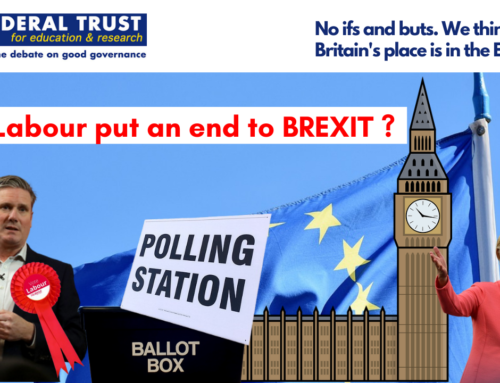Following recent protracted post-Brexit negotiations on the Northern Ireland Protocol (the Protocol), there persists an underlying crisis of mistrust between the United Kingdom government and the European Union. This is in spite of the UK Parliament passing the arduously negotiated Stormont Brake provisions of the UK-EU Windsor Framework on Wednesday, March 23rd.
On the very same day, the European Union (EU) passed a new Regulation 2023/657, which lays down rules for the application of the EU’s rights in the implementation and enforcement of the UK-EU Withdrawal Agreement (WA) and the Trade and Cooperation Agreement (TCA).
The Regulation, which is due to come into force on 11th April, 2023 will set out new rules, determining how the EU deals with future possible instances of the UK threatening to revoke aspects of those treaties and blocking recourse to measures for the settlement of disputes. It is a clear warning shot across the bows of any future British government inclined to play fast and loose with the WA and TCA.
Background to UK-initiated frictions with the EU
Since the WA became effective in February 2020, the UK introduced several measures which heightened frictions with the EU.
Initially, this involved the UK’s Internal Market Bill, 2020. This proposed legislation would have laid the grounds for the UK to impose unilateral actions to revoke provisions of the Protocol.
Subsequently, the UK has threatened to invoke Article 16 of the Protocol allowing it to “unilaterally take appropriate safeguard measures”. These would arise where the Protocol causes “serious economic, societal or environmental difficulties that are liable to persist or result in a diversion of trade”.
Frictions between the UK and the EU also occurred in other sectors, such as fisheries.
Additional complications arose when the UK government introduced the Northern Ireland Protocol Bill in June 2022. This highly-controversial legislation would have allowed the UK to terminate provisions of the Protocol concerning the jurisdiction of the European Court of Justice, State aid and control over customs and border movements.
The EU’s new measures
To tackle future non-compliance of the WA and TCA, the EU’s new regulation will incorporate several new provisions involving remedial, rebalancing, safeguard and countermeasures. It will also authorise a suspension of obligations. Notably these provisions will only be invoked to induce the UK in committing to complying with its obligations under both agreements. In general, the measures would be required to be proportionate in their objectives. The Regulation will also authorise the European Commission to amend, suspend or repeal these provisions under implementing acts.
These measures are also designed to apply in circumstances where the UK may be unwilling to cooperate with the agreements’ relevant dispute settlement mechanisms, which would otherwise have been expected to apply.
The new regulation would also establish rules and procedures to ensure an effective and timely exercise of the EU’s rights in enforcing and implementing both agreements. Moreover, the Commission would be authorised to set out restrictions on trade, investment or other activities in the case of a suspension of obligations.
Greater say for EU member governments
EU member states will be empowered to request for the adoption of the measures referred to above. In these contexts, they will be enabled to initiate a review of divergences in State aid, labour, environment, social and climate protections. Such requests would be taken under consideration by the Commission for discussions under the TCA’s Partnership Council.
Lastly, the Regulation would establish a “UK Committee” constituted of EU member states which would control the exercise of implementing acts by the Commission, while a review of the Regulation would occur five years after its entry into force.
A rocky road ahead
While the passing of the Stormont Brake provisions may indicate a more positive tone of future negotiations between the UK government and the EU, it seems clear that any goodwill and trust on the part of the EU towards the UK government has been considerably damaged by events of the past five years.
Unlike the terms of these agreements where the Commission had the exclusive role of monitoring their implementation, the new Regulation provides a greater role of the EU member states. This could throw up even more complications where divergences in various standards are perceived to have taken place.
Far from once much vaunted Brexit aspirations of driving a wedge between certain EU member states against Brussels institutions, the UK’s unwillingness to abide by its own agreements with the EU has only fuelled Europe’s national governments with suspicions over the UK government’s tendency towards unilateralism.
As a result of the new Regulation, the UK government will not only have to ensure it maintains positive relations with the EU’s institutions, but also with its 27 member states if it is to keep access to the Single Market through the TCA. Successive British governments have made it harder than it need have been to maintain this access.
IMAGE COPYRIGHT NOTICE:
Picture by Simon Walker / No 10 Downing Street (https://flic.kr/p/2ojhbTX), The Prime Minister welcomes the President of the European Commission.
We removed the background of the image to integrate it into another picture; Licence CC BY 2.0






Leave A Comment